The City of Vancouver’s plan to clean up a section of the CRAB Park homeless camp continued Monday as the few remaining people in the targeted area packed up their belongings and moved to a temporary spot outside the fenced-off encampment.
Park rangers, city and parks crews along with police and support workers were on scene Monday morning to launch the beginning of what is anticipated to be a week-long removal of debris on the waterfront peninsula.
“The cleanup and compliance process is now underway to ensure that those sheltering in the park have a cleaner and safer daytime area and that the area is better positioned to meet health and safety standards going forward,” the city said in a statement Monday.
The initial plan was to have a backhoe, front-end loader and garbage trucks in use Monday but the process to move people out of the encampment appeared to be taking some time and the heavy machinery was not on site.
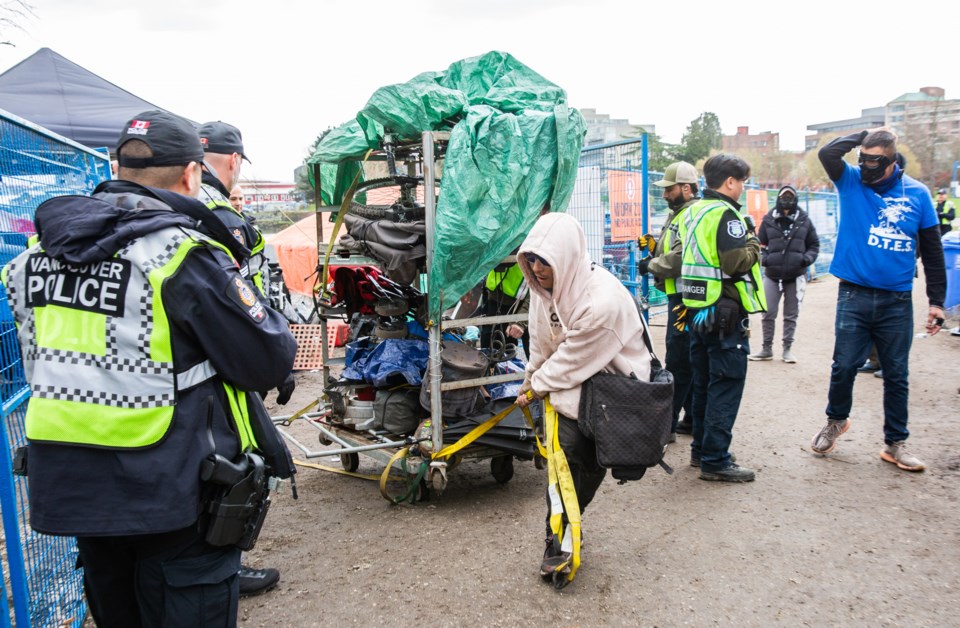
'Being done respectfully'
Amit Gandha, director of parks, was at the site Monday and noted many camp residents had relocated to a temporary sheltering area on the slope facing the encampment. As of noon, five people remained in the camp, down from 30.
“Our intention is always to work with people, and so that's what today is,” Gandha told Glacier Media. “We’re going to continue the conversations and — to be honest — it's going quite well. Even though it looks slow, it's moving ahead and it's being done respectfully.”
Gandha said heavy machinery could be brought in later in the day or tomorrow.
“We're planning to get this work done within the week because we want to be mindful and respectful of people that actually have relocated outside here,” he said, pointing to the sheltering area on the slope.
“They’ve really taken that leap of faith in trusting us, and we want to do our best to make sure that we're going to deliver, as well.”
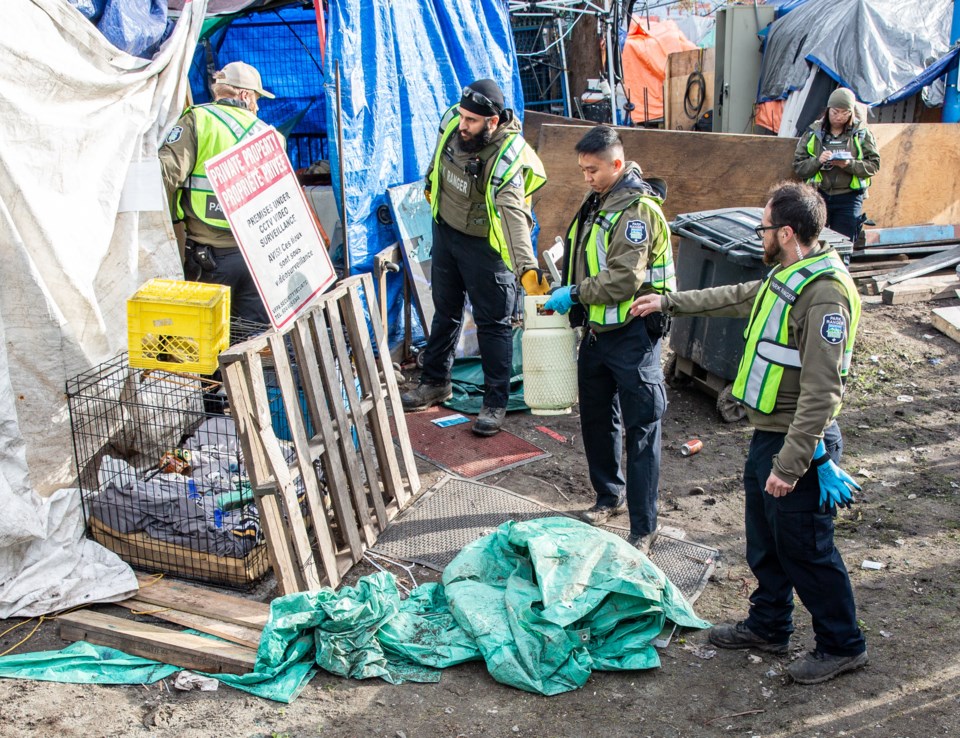
Needles and feces
Crews are focused on the “daytime area” of the camp, which was allowed by a park board general manager’s order in April 2022 for residents physically unable to take down their structures each morning.
That order stipulated that people cannot move items such as motorcycles, generators, wood, pallets, propane tanks or building materials into the area. Glacier Media observed considerable debris in the space Monday, including propane tanks, bicycle parts and building materials.
At a media briefing March 12, park board general manager Steve Jackson told reporters that the cleanup was necessary because of a rat infestation, large amounts of debris, garbage, soiled materials, propane tanks, needles and feces.
City staff have emphasized the work is not a decampment, with residents able to return once the cleanup is completed. At the same time, BC Housing and the city’s homelessness services department continue to liaise with residents to access shelter.
Staff and peers from non-profits, Indigenous organizations and Vancouver Coastal Health have been on site to support people and help them pack and relocate. Two gazebos for a kitchen and donation tent have also been set up.
Washrooms are located a short walk from the sheltering area.
“The safety of those sheltering in the park, our staff, and the public remain our priority, and we are committed to working with the community to address issues that impact the health and safety of those sheltering in the park,” the city said in its statement.
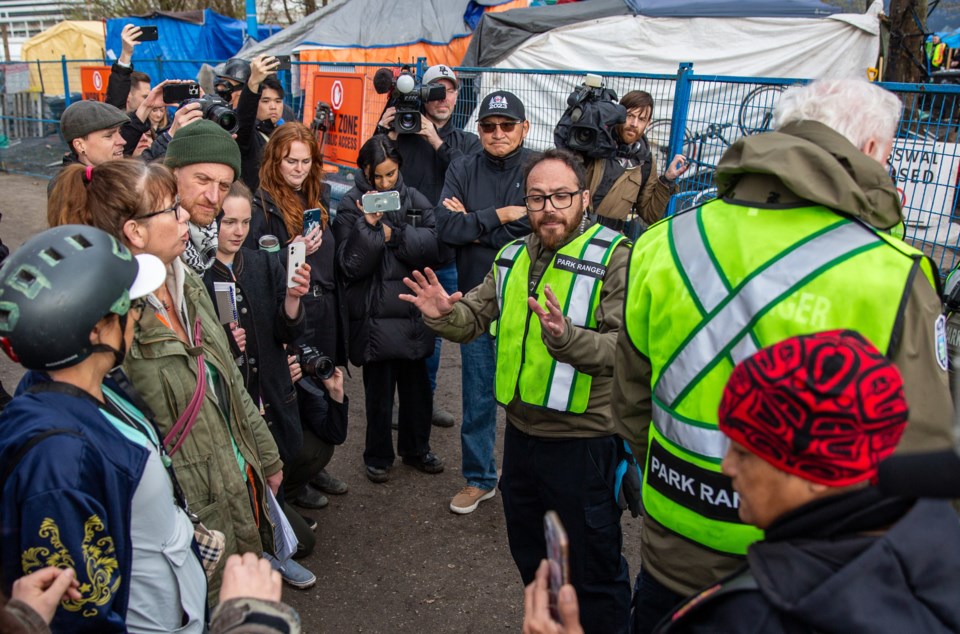
'Turned upside down'
Fiona York, an activist acting on behalf of residents, told reporters Monday that there are no fire or public health orders in place to support the city’s plan. York said the city is also proceeding with its plan despite an ongoing complaint before the BC Human Rights Tribunal that camp residents lodged against the city and park board.
“People's lives are really turned upside down,” she said.
“There's people who can’t access their belongings, or people who just feel devastated that even if they got out with some small amount of their belongings, there’s still so much left behind. For people who have lived here for years or months, having to witness this today is really traumatizing.”
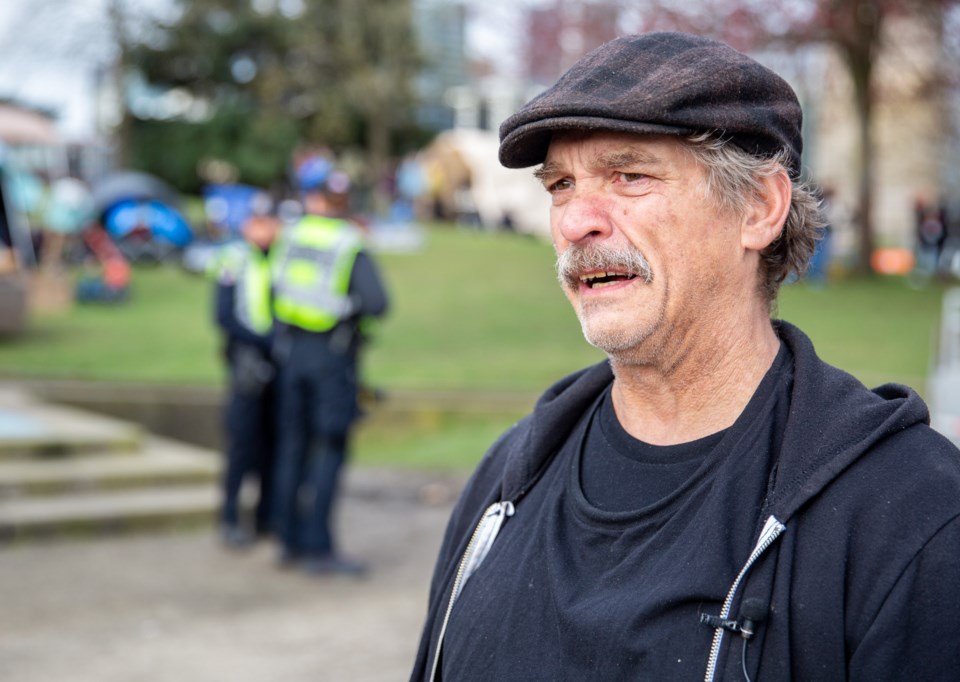
'I want to feed everybody'
Camp resident Dave Bradbury said he last paid rent three years ago in Kitimat. But a combination of his construction work drying up and his wife dying left him homeless. He’s coming up on two years living at CRAB Park.
Bradbury had already moved a large amount of his belongings to the temporary sheltering area Monday morning. Those belongings included a variety of kitchenware, including a grill, fridge and supplies for feeding his neighbours.
“I want to give back to the people who helped me when I lost my wife,” he said, noting he wasn’t happy about having to temporarily relocate but emphasized his obligation is to feed residents. “I want to feed everybody, and I’m going to [do that].”
He disputed the city’s reasons for having to clean up the encampment, noting concerns over rats are unwarranted. Bradbury said there are more rats visible in the Downtown Eastside than at the park.
“It's just another bunch of BS they throw out at the public,” he said.
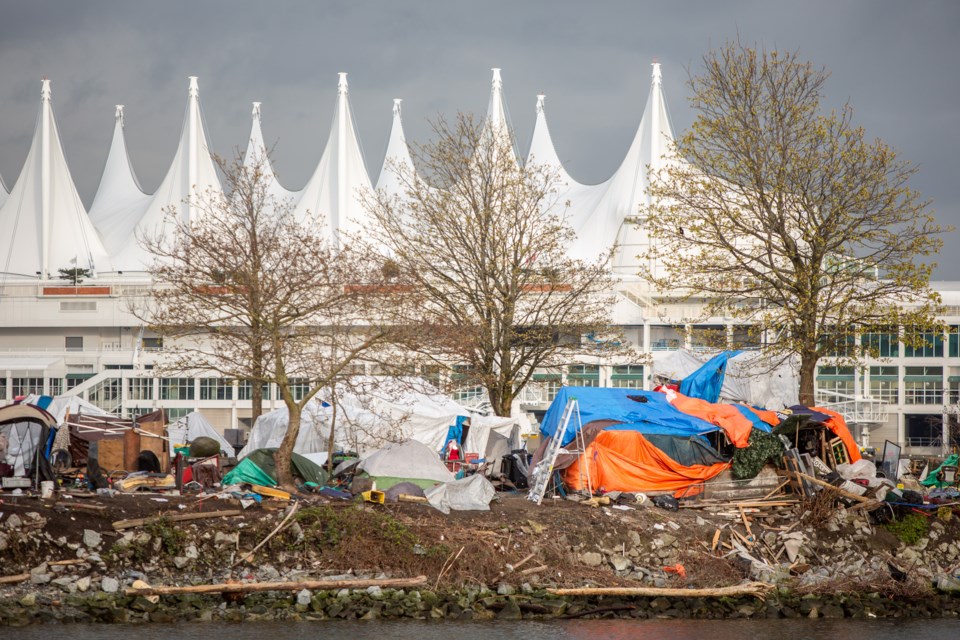
Tiny homes
Bradbury was offered a spot at a shelter last week, but he refused.
“Absolutely disgusting,” he said, acknowledging that life in a tent, particularly in inclement weather, is not pleasant but beats a shelter.
“Any tent down here is better than any shelter up there in the city…you have a fair bit of privacy, you have a lot of people that care for you, you get a lot of people donating stuff to us. And we have church on Sundays down here, too.”
Former city councillor Jean Swanson was at the camp Monday and said a better solution to a temporary sheltering area would be to rent the adjacent vacant parking lot owned by the Vancouver Port Authority and move tiny homes onto it.
“Which is where the residents of CRAB want to go,” Swanson said. “It would be way more humane to put people over there, give them a tiny home, with a wooden roof, doors that can lock, proper sanitation. It’s sitting right there and it’s a solution that doesn’t involve tons of cops and tons of park rangers.”
Update: The city's communications department contacted Glacier Media since this story was first posted to now say all five remaining residents of the camp have relocated to the temporary sheltering area.




